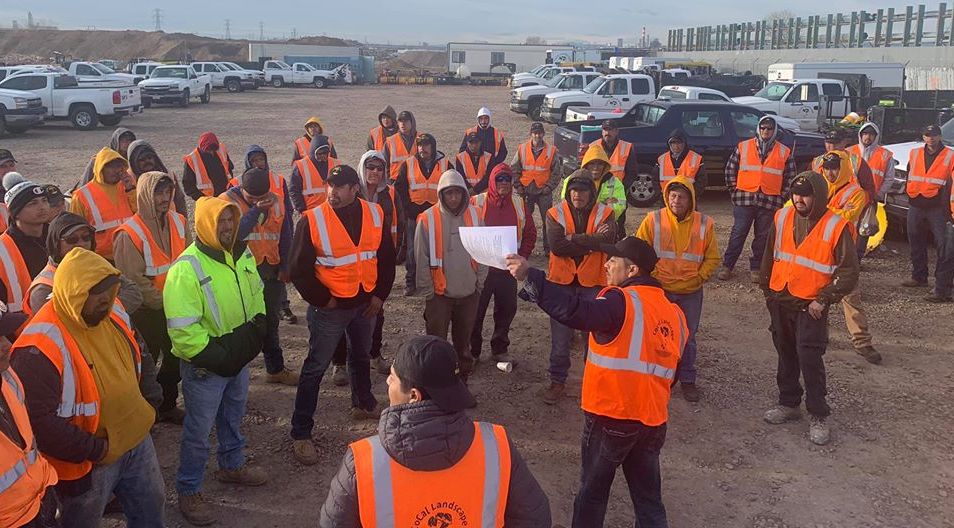
A crew member of Mariposa Landscapes, Inc. working in Rancho Mirage, CA made international news last month simply trying to do his job. Why? Because he captured on video an unidentified woman approaching him and repeatedly asking to see his “papers.” Newsweek, NBC Palm Springs, TMZ, the Daily Mail in the UK, and many more have all posted the video and chronicled the incident due to its inflammatory nature.
According to NBC Palm Springs, Juan Andrade has worked for the landscaping company for 10 years. The woman who questioned him at the Parkview Villas had reportedly approached him three months prior when she told him to “go back to his country.” This time, she was unmasked and the video records Andrade asking her to step back for social distancing and the contentious discussion continues as she eventually walks away. “When she was harassing me, I started to feel mad because I was just doing my work,” Andrade told NBC.
While the City Attorney deemed it an “isolated incident,” an investigation by Parkview Villas, an affordable housing complex for those 55+ owned by the city, could lead to the woman’s eviction under the Housing Authority’s zero tolerance policy for harassment, reported NBC. Andrade told NBC he hopes his story can be a catalyst for change.
Slightly less well known, but still news-making was another incident in July when a former New Hampshire conservative talk radio host at WSMN, Dianna Ploss, filmed herself yelling at a landscape crew in Nashua because she heard the foreman speaking Spanish to employees. After repeatedly telling them to speak English, she asked “Is anybody here legal?” The radio station has since released a statement that Ploss is no longer affiliated with them and that WSMN “will not tolerate discrimination, racism, or hatred.” Ploss has defended her actions, posting on facebook, “So, if you want people in America to speak English, that makes you a ‘racist.'”
While these incidents may be old news by next week, they’re indicative of an increasing divide in the U.S. over race and immigration issues. And with more than 500,000 Hispanic-Americans working in landscaping across the U.S., it’s one that some in the industry may find themselves confronting in a very public way. But beyond race and immigration, no matter what your personal beliefs, stressors such as COVID, opinions on “essential businesses,” unemployment, the election, and uncertainty about the future are all affecting the current public climate. For landscape companies, whose crews work outside, this tension can present unique challenges. What is an employer’s responsibility in ensuring a harassment-free work environment from third parties? If a situation escalates, do employers face liability? Regardless of the issue, are employees equipped to handle angry clients, neighbors, or members of the public who approach them?
Personal Perspective
To gain perspective on the issue, Turf reached out to a uniquely qualified source. Marisol Medrano is president of the National Hispanic Landscape Alliance (NHLA), which joined the National Association of Landscape Professionals (NALP) this past April, and works as director of human resources for CoCal Landscape in Denver, CO. Her father, Jesus “Chuy” Medrano co-founded CoCal in 1992, which today employs as many 350 people in the busy season. While Chuy Medrano was born in Mexico, he became a U.S. citizen and now regularly hires legal seasonal employees (in years past, as many as 160) through the H-2B program, a controversial work program for foreign nationals. His struggle to hire employees within the U.S. was chronicled by The Denver Post in a 2017 article.

As HR director for a predominantly Hispanic company, Marisol Medrano typically sees one or two incidents a year of third party harassment toward CoCal employees. This year has been different. “This is a great topic to cover,” she says, “there’s been an uptick. We had an employee assaulted a month ago.” According to Medrano, an unidentified man jumped out of his car, punched an employee, then got back in his car and drove away. Medrano believes the employee was using a blower and the car owner was angry about trash being blown on his car—an incident that could potentially happen anywhere, to any landscape crew.
Just two weeks ago, she adds, another person screamed profanities at one of their crews including words like “wetbacks” and “f..ing immigrants” due to a dispute over revving engines. Medrano has encountered this before, including dirty diapers being thrown at employees. “What do you do?” she asks, “Year after year, we tell crews not to fight back. They’re always going to be in a losing position. There’s the language barrier…. I ask them to avoid conflict… to me, it just seems sad.”
In the case of the assault, the crew got the license plate number and contacted the police as well as the crew supervisor. Medrano reached out to the victim and also contacted the iCareTeam, an employee care service of bi-lingual mentors and nondenominational chaplains who focus on helping people in key areas from emotional health to financial resources. “We pay for the service and it’s free for employees,” says Medrano. “It’s completely confidential and voluntary. It also doesn’t have the stigma of therapy. They assist in funerals, drug and alcohol programs, etc. It’s worked wonders.”

Besides iCareTeam referral, Medrano says they use incidents “as a learning opportunity. We’ll talk about the incident in a safety meeting while keeping employee names out of it.” While CoCal has anti-harassment policies in place, when asked if they have written policies regarding third party harassment, Medrano said they don’t currently, but adds, “It’s not a bad idea.” She says, “I guess I never really thought about all the things that happen as a whole. I just deal with each incident.”
Prevention
Jennifer Shaw, founder of Shaw Law Group and an employment law expert in anti-discrimination and harassment policies and procedures in Sacramento, CA, spoke to Turf about the legal implications of third party harassment. She says most employers, the public, and education efforts understandably focus on workplace harassment within the company, but an employer can still be liable for harassment from an outsider. “In many states, like California, there is a separate cause of action against employers that fail to prevent harassment by third parties, such as clients, customers, and vendors,” she comments.

While the law recognizes that employers cannot prevent all acts of harassment by a third party, a negligence standard applies to an employer’s potential liability. In other words, an employer may be held liable to the extent it knew—or should have known—of the third party’s conduct and then failed to take immediate and appropriate action to stop it.
As a result, an employer’s first focus should be on prevention of harassment. This means having written policies, as well as training, that anticipates and addresses potential third party harassment risks. “Every state has an equal employment opportunity (EEO) agency that provides guidance in this area,” says Shaw. “[Additionally], employers should partner with experienced employment law counsel to ensure their policies are focused on prevention.” Employers should also consider informing customers of their expectations regarding conduct and address in contracts the rights and responsibilities in the event of an incident or claim.
Responding to Employee Concerns
Equally important to prevention is taking prompt corrective action should an employee raise concerns. If facts are unclear, the employer should conduct an investigation to draw a reasonable conclusion if the third party’s actions violated the employer’s anti-harassment policies. But how far must an employer go to keep employees safe from a harassing third party?
Shaw clarifies, “There are two obligations: (1) stop the current conduct; and (2) prevent future misconduct. The right steps will differ in each case. If someone has a pattern of harassment, the employer will need to take stronger action for instance. But even one incident can create liability, depending on its severity. At a minimum, employers should provide regular training on harassment prevention and other EEO issues, document any inappropriate conduct in an internal document, and advise the perpetrator in writing of future expectations.” An employer should prepare in advance how it will address a person (even a customer) that violates the organization’s policies. Although it may be difficult to confront a customer, management either must address the concern or risk a legal claim.
In a cautionary tale, Shaw tells of a federal appellate court that affirmed a $250,000 jury award against Costco for its failure to adequately protect one of its employees from a customer who repeatedly stalked her. The employee in EEOC v. Costco Wholesale Corp. reported to her supervisor that the customer frequently approached her at work, referred to her as “pretty” and “exotic,” asked questions of a personal nature, videotaped her, and repeatedly asked her out. The employee even obtained a court-issued restraining order against him.
Store management directed the customer not to interact with the employee, but took no action when he continued to do so. Costco also rescinded the customer’s membership card, but only when he verbally attacked the employee. Management also denied the employee’s request to park her car closer to the store entrance. The court described Costco’s response as “unreasonably weak.”
While the Costco example is extreme, what if a landscape company encounters a single, isolated incident. Can it be allowed to just “blow over?” “Definitely not,” cautions Shaw. “It’s critical that employers address every incident, no matter how minor. That’s how the employer can prove it is taking steps to prevent harassment, rather than just addressing it after it happens.”
What if an incident lands on the other end of the spectrum, such as escalating into physical harm (such as with CoCal’s employee) or criminal behavior on either end? Shaw advises that, “Employers must contact law enforcement immediately if they believe anyone’s safety might be in danger. It is important that employees understand that is the right thing to do, and they should never question whether it is acceptable to ask for help.”
Know Your Rights
Back to the specific issue of immigration: legally, members of the public have no authority to approach an employee and ask to see their documentation. “In terms of immigration notices, only the employer and federal government agencies [can ask for these items],” says Shaw. “Employers must ensure these documents are properly maintained so there is no inadvertent disclosure.”
Shaw adds, “Unfortunately, there are unscrupulous employers in every field. But undocumented employees are one of the most vulnerable populations in the workplace because of their fear of government intervention. If employers want to preserve their businesses, they must put politics aside and do the right thing. Every time.”











![[VIDEO] Dickies®: Discover Workwear That’s Anything But Uniform](https://turfmagazine.com/wp-content/uploads/2023/06/1647663814-4b1a2a7742790a9b1e97a3b963477850192e1d6a9dfba9b07214a77bae25d6e3-d-218x150.jpg)






























![[VIDEO] Dickies®: Discover Workwear That’s Anything But Uniform](https://turfmagazine.com/wp-content/uploads/2023/06/1647663814-4b1a2a7742790a9b1e97a3b963477850192e1d6a9dfba9b07214a77bae25d6e3-d-324x160.jpg)